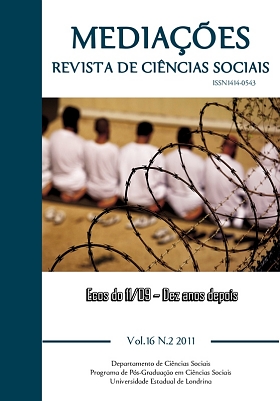Private security and critical infrastructure: the challenges for the governance of U.S. homeland security after September 11
DOI:
https://doi.org/10.5433/2176-6665.2011v16n2p158Keywords:
United States of America, Private security, Critical infrastructure, Homeland security.Abstract
The governance of U.S.A. homeland security since the terrorist attacks of September 11, 2001 has been marked by the participation of the private security industry. Externally, the U.S.A. has been using the services of private military companies to support or protect its human and material resources in conflict zones. Internally, threats of attacks against United State's infrastructure have raised the status of the private security industry to key partner in promoting homeland security. A growing literature has been addressing the use of private military companies in international conflicts, but the role of private security in promoting U.S.A homeland security has been largely neglected. The aim of this paper is to discuss some of the challenges and implications that private security imposes to the governance of U.S.A homeland security post-September 11.Downloads
References
BAMBERGER, Kenneth. Global terror, private infrastructure, and domestic governance. In: CRAWFORD, Beverly (org.). The impact of globalization on the United States: law and Governance. United States: Praeger Publishers, 2008. v. 2.
BLACK, Julian. Decentring regulation: the role of regulation and self-regulation in a "post-regulatory" world. Current Legal Problems, London, n. 54, p. 103-146, 2001.
BRODEUR, Jean-Paul. High and low policing in post-9/11 times. Policing, United Kingdom, v. 1, n. 1, p. 25-37, 2007.
BURRIS, Scott; KEMPA, Michael; SHEARING, Clifford. Changes in governance: a cross-disciplinary review of current scholarship. Akron Law Review, Akron, v. 41, p. 1-66, 2008.
CEPIK, Marco. Serviços de inteligência: agilidade e transparência como dilemas de institucionalização. 2001. Tese (Doutorado em Ciência Política) - Instituto Universitário de Pesquisas do Rio de Janeiro, Rio de Janeiro, 2001.
CONNORS, Edward; CUNNINGHAM, William; OHLHAUSEN, Peter. Operation cooperation: a literature review of cooperation and partnerships between law enforcement and private security organizations. Washington: Department of Justice, Bureau of Justice Assistance, 1999.
CUNNINGHAM, William; TAYLOR, Todd. The hallcrest report: private security and police in America. Portland: Chancellor, 1985.
DIJK, Jan Van. The world of crime: breaking the silence on problems of security, justice and development across the world UK. London: Sage Publications, 2008.
FLYNN, Stephen. The edge of disaster: rebuilding a resilient nation. New York: Random House, 2007.
FRIEDMAN, Benjamin. Homeland security. Foreign Policy, United States, n. 49, p. 22-29, 2005.
KAKALIK, James; WILDHORN, Sorrel. Private security in the United States. Washington, DC: U.S. Department of Justice, National Institute of Law Enforcement and Criminal Justice, Law Enforcement Assistance Administration, 1972. v. 5.
MANNING, Peter. The United States of America. In: JONES, Trevor; NEWBURN, Tim (org.). Plural policing: a comparative perspective. London: Routledge, 2006.
MORABITO, Andrew; GREENBERG, Sheldon. Engaging the private sector to promote homeland security: law enforcement-private security partnerships. Washington: Department of Justice, Bureau of Justice Assistance, 2005. Disponível em: www.ncjrs.gov/pdffiles1/bja/210678.pdf. Acesso em: 15 maio 2011.
MORAN, Michael. The rise of the regulatory state in Britain. Parliamentary Affairs, London, v. 54, n. 1, p. 19-34, 2001.
PARFOMAK, Paul W. Guarding America: security guards and U.S. critical infrastructure protection. Washington: Congressional Research Service, The Library of Congress, 2004a.
PARFOMAK, Paul W. The U.S. contract security guard industry: an introduction to services and firms. Washington: Congressional Research Service, The Library of Congress, 2004b.
PICCIOTO, Sol. Regulatory networks and global governance. In: W.G. Hart Legal Workshop. The Retreat of the State: Challenges to Law and Lawyers. London: Institute of Advanced Legal Studies, University of London, 2006.
SHEARING, Clifford. A relação entre policiamento público e policiamento privado. In: TONRY, Michael; MORRIS, Norval (org.). Policiamento moderno. São Paulo: Edusp, 2003.
SHEARING, Clifford; STENNING, Philip. Modem private security: its growth and implications. Crime and Justice, San Francisco, v. 3, p. 193-245, 1981.
SINGER, Peter. Corporate warriors: the rise of the privatized military industry and its ramifications for international security. International Security, Cambridge, v. 26, n. 3, p. 186-220, 2001/2002.
STEDEN, Ronald van; SARRE, Rick. The tragic quality of contract guards: a discussion of the reach and theory of private security in the world today. The Journal of Criminal Justice Research, United States, v. 1, n. 1, 2010.
WOOD, Jennifer; DUPONT, Benoît. Democracy, society and the governance of security. Cambridge: Cambridge University Press, 2006.
ZEDNER, Lucia. Liquid security: 'managing the market for crime control'. Criminology e Criminal Justice, United Kingdom, v. 6, n. 3, p. 267-288, 2006.
Downloads
Published
How to Cite
Issue
Section
License
Copyright (c) 2011 Cleber da Silva Lopes

This work is licensed under a Creative Commons Attribution 4.0 International License.
Copyright on articles published in Mediações belongs to the author(s): in the case of partial or entire republication of the original publication, we ask author(s) to indicate the original publication in the periodical.
Mediações uses the Creative Commons Attribution 4.0 International license, which allows Open Access, enabling any user to read, download, copy and disseminate its content so long as adequately referenced.
The opinions expressed by the author(s) are their sole responsibility.
































